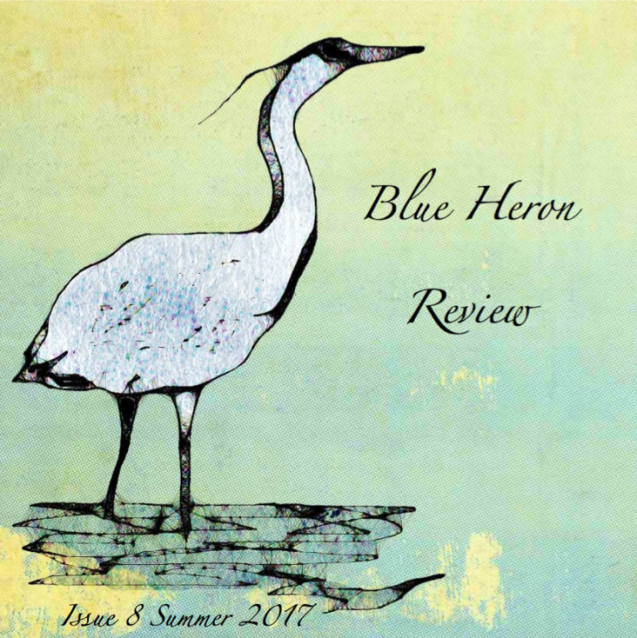
(Cover art by Pd Lietz)
THE HEALING ISSUE
CONTRIBUTORS
Poets:
Nina Bannett, Michael Hettich, Gary Jones, M J Iuppa, Catherine Stearns, Karla Huston, Joan Mazza, Jan Chronister, Charlene Langfur, Rachel Dacus, M A H Hinton, Cathryn Cofell, Guy Thorvaldsen, Emily Bowles, Tricia Knoll, Marguerite G Bouvard, Cliff Wedgbury, Lawrence William Berggoetz, Ruth McArthur, Gail Tirone, Kathy Lohrum Cotton, Claire Joysmith, Sheryl Slocum, Tori Grant Welhouse, Kersten Christianson, Roseann St Aubin, Annie Blake, Priscilla Atkins, Janet McCann, Michael Jack O’Brien, Jessica Moser, Jackie Langetieg, Jim Landwehr, Lynne Burnett, Susan Twiggs, Laura Johnson, Mary Strong Jackson, Diane Sahms-Guarnieri, Jonel Abellanosa, Kevin Shyne, Ronnie Hess, Susie Foster Hale, Jodi Andrews, Lorraine Caputo, Kristen Baum DeBeasi, Sandra Lindow, James Dott, Chelsea Comeau, Joanne M Clarkson, Janet Taliaferro, Prerna Bakshi, Jude Goodwin, Karla Van Vliet, Susan Martell Huebner, Laurel Devitt, Kelsey Dean, Martin Willitts Jr, Bobbie Lee Lovell
Artists:
Pd Lietz (Cover Artist), Jason Iffert, Devi S Laskar, Robina Anstey, Kurt John Huebner, Leilani Carroll, Fiona Capuano, Karen VandenBos, Melodie Past
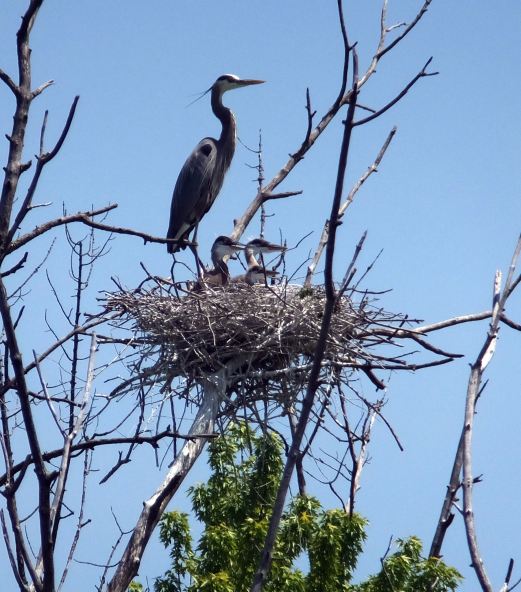
(artist credit: Jason Iffert)
NINA BANNETT
Insights from Beloved
I clawed my way back from the edge of the world.
Sethe and her dead have fought it out.
I am my own.
My love of learning surpassing my fear of voice,
I took in caretaking, books, words like snow.
Trees and people seem smaller now,
and I’ve found my way back to them.
No one tried to smash me in the shed.
But I recognize the fear she had,
knowing the unknowable is inside her ma’am.
The mythic daughter disappears,
the one who battles her mother’s love,
revels in its thickness, skates on thin ice.
She died and I grew.
I poured through the Clearing,
the space that parted itself for prayer.
Nina Bannett’s poetry has appeared in Bellevue Literary Review, Open Minds Quarterly, and Incandescent Minds, and online in Medical Literary Messenger and Amygdala. Her books, Lithium Witness and These Acts of Water, focus on mental illness. She is Professor of English and department chairperson at New York City College of Technology, CUNY.
MICHAEL HETTICH
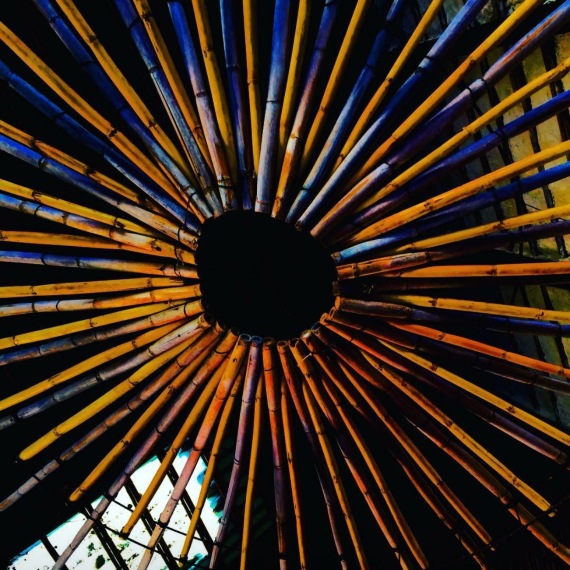
(artist credit: Devi S Laskar)
This Yearning
We were trying to imagine how we might side-step
time’s path, stop moving yet still not be lost
to the world. Not yet. There were so many birds
on that island, and if most of them were black with a glint
they had carried from other, deeper fires.
And if their voices were harsher than language
can sing to make sense, that was nothing to us then.
We didn’t need colors or the smell of the ocean.
We were not yearning for the savor of coffee
or a glass of good wine. We just wanted to live
like trees do, as non-selves; we wanted to hum
like certain rocks seem to, the rocks that inhabit
their own weight, rocks we might build our house with
to dream in. Listen: Sometimes a moment
stands up and walks away, like an elegant woman
might simply walk away from a lover whose body
and inner life don’t match. Watch her. So we wake
and remember the flares we lit with the flint
of our bones and shot at the night-sky: Light
so rare and true it seemed to become
its own small star. Then we saw the constellations.
Michael Hettich’s most recent book of poetry, Systems of Vanishing, won the 2013 Tampa Review Prize in Poetry and was published in 2014 by University of Tampa Press. Other books include, The Animals Beyond Us (New Rivers, 2011), and Like Happiness (Anhinga, 2010). His work has appeared in numerous journals, including Orion, Poetry East, Ploughshares, Prairie Schooner, and Notre Dame Review, and he has collaborated extensively with visual artists and musicians. His website is michaelhettich.com.
GARY JONES
The Tragedies
The tragedies are manageable: the mudslides,
the earthquakes, the Western fires,
the tornadoes, hurricanes, and tsunamis;
but small acts of kindness make me weep:
a nurse speaking softly, her face next to his,
her motherly pat on a bruised needled hand,
I’ll be here, she whispers, if you need me.
Gary Jones is a writer and teacher who summers in Door County and winters near the UW-Platteville campus.
M J IUPPA
Moth Orchid
Placing this sleeping plant in the light
of an East facing window, I slip
two ice cubes on its dirt, wondering
if it shivers with the initial cold that
touches its nodes, its roots, its glossy
flat leaves, full of quiet green insight.
I look at the undersides, as if I’m checking
myself for that latent lump, that cracked
skin that’s worrisome like memory’s
shadowy hand sliding past blind
spots. Will this be the dream I force
in winter when I cannot control
the flow of air? Will my slow breath
re-ignite a bulb’s patience,
sending willowy spikes
to twine up the slight stakes?
Will I hold on to the possibilities?
I say beauty can hurt you if
you aren’t careful. Who will
heed my words?
I must trust myself.
M J Iuppa is the Director of the Visual and Performing Arts Minor Program and Lecturer in Creative Writing at St. John Fisher College; and since 2000 to present, is a part time lecturer in Creative Writing at The College at Brockport. Since 1986, she has been a teaching artist, working with students, K-12, in Rochester, NY, and surrounding area. She has three full-length poetry collections, most recently Small Worlds Floating (2016) as well as Within Reach (2010) both from Cherry Grove Collections; Night Traveler (Foothills Publishing, 2003); and 5 chapbooks. She lives on a small farm in Hamlin, NY.
CATHERINE STEARNS
The Chain Fountain
(–with a final line from Willem de Koonig’s last notebook)
On YouTube the chain fountain arcs
high into air, pulled into motion
by an inwardness like the contortionist’s
at the Illinois State Fair
whose body, tattooed with words,
had to twist and turn
to make meaning.
It falls with a kick,
with a suck pushing down,
and who knows what
sideways forces?
This, this, I think
is how the self spills
over puny greed—
with a sudden leap
Or, with a more deliberate unfolding,
as you are unfolding
chrysanthemum paper from our gift of a scarf
to fall around you as light fades
on a winter’s night, alone and wondering
who you are, whose you are,
what touch
the selvage to keep from unraveling
what you have seen
and lost, and seen again
and lost again
that the sky is blue, that the grass is green
Catherine Stearns has had poems recently published in Yale Review, North American Review, and New Ohio Review, among other places, and she has a chapbook forthcoming from Slate Roof Press. She is writer-in-residence at The Roxbury Latin School in Boston.
KARLA HUSTON
Theory of Numbness
After a trip to the dentist,
I see the left side of my face
sag like an old pair of socks;
even smiling hurts. Finally,
my old face lifts and returns.
Yet days later, my cheek still tingles,
the bruise of the deed
under cover of flesh and muscle.
I know now that if you ignore it,
pain like grief sometimes goes away,
but another ache takes
its place, the ghost of it frozen
in your heart, so deep— the shadow
of something you don’t know you
need till you see that it’s gone.
Karla Huston, Wisconsin Poet Laureate (2017-2018), is the author of A Theory of Lipstick (Main Street Rag, 2013), winner of a Wisconsin Library Association Outstanding Achievement Award. She has published 8 chapbooks including, Grief Bone, recently from Five-Oaks Press. Her poems, reviews and interviews have been published widely, including in the 2012 Pushcart Best of the Small Presses anthology. She teaches poetry writing at The Mill: A Place for Writers in Appleton, Wisconsin, and serves on the author’s committee for the Fox Cities Book Festival, as well as the board of directors for The Mill: A Place for Writers.
JOAN MAZZA
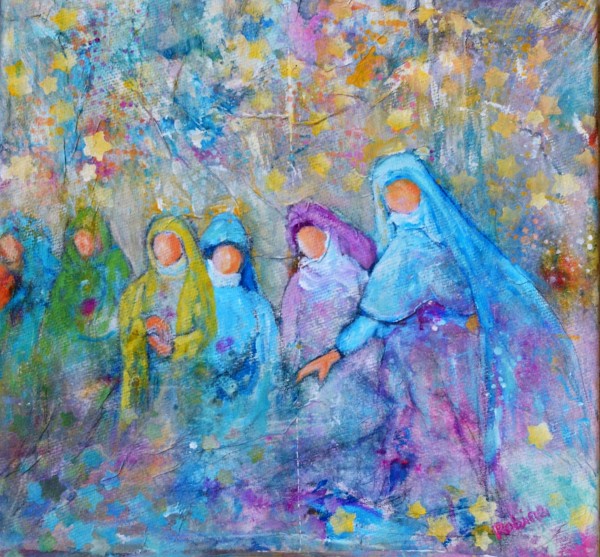
(artist credit: Robina Anstey / “Your Angels Will Carry You”)
Letting Go of All Bad News
I step across the threshold of my studio
and the world falls away behind me. Steeped
in the fragrances of fabric sizing, dyes,
sparkly papers, ink, I can think and reap
what I sew. Hot tea to drink while I paste paper
fishes on a mottled blue background that feed
on acrylics. Metal snails, starfish sewn
on a quilt block of patched blues. Red seed beads
stitched on ribbons to resemble seaweed.
Embroidered branches on polished cottons, skeins
of floss laid out, grouped by color on a silver tray.
I embroider the world. Beauty reigns,
leaps from my hands, dims the din of shouts.
Calming mantra of needle in, needle out.
Joan Mazza has worked as a medical microbiologist, psychotherapist, seminar leader, and has been a Pushcart Prize and Best of the Net nominee. Author of six books, including, Dreaming Your Real Self (Penguin/Putnam), her poetry has appeared in Rattle, Kestrel, The MacGuffin, Mezzo Cammin, Potomac Review, and The Nation. She ran away from the hurricanes of South Florida to be surprised by the earthquakes and tornadoes of rural central Virginia, where she writes poetry and does fabric and paper art. www.JoanMazza.com
JAN CHRONISTER
Self-preservation
sometimes I just want
to put a lid on it
screw the ring on
seal it up in a jar
process the pain
label with today’s date
hide it away in the cellar
wait long enough
until I’m hungry
or forget
Jan Chronister lives and writes in the woods near Maple, Wisconsin. Her chapbook Target Practice was published in 2009 by Parallel Press. She is currently serving as president of the Wisconsin Fellowship of Poets.
CHARLENE LANGFUR
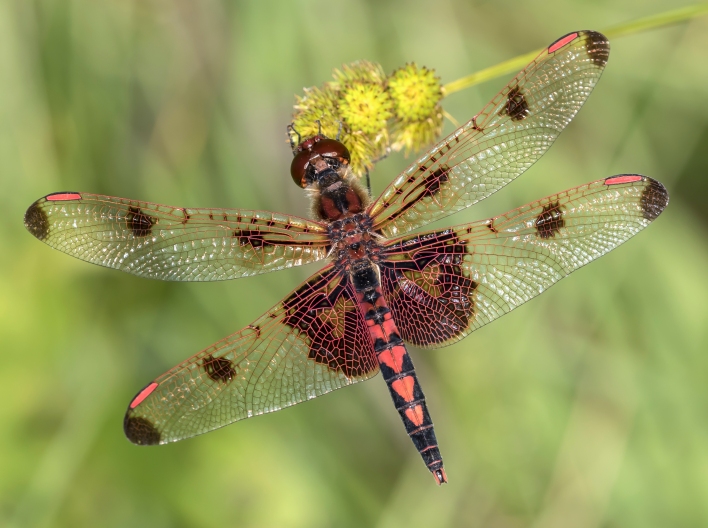
(artist credit: Kurt John Huebner)
Small Things Matter to Ordinary People
They come like dreams in which all the troubles
have already passed through them. They are
tempered. Miracles of the mind at rest,
ideas that take to us when we’re least aware.
Planting the garden in the spring. The idea of it
without the actual planting of it starts, seeds in rows
and squares, then hauling rocks for the borders.
Soon sunflowers are grown giant and cosmos growing
light as air itself, delicate enough for any of us to imitate.
How easy to sketch them in a living room chair
at night, draw how they grow from the memory of them.
The willowy and the green. The sycamore trees
in the backyard protecting the house from heat
and everything else. Things that keep our passions
from falling away. That bring what comes to belong here with us.
What we sit with and see up close. Wrens outside the window
so small they are almost not there at all,
hummingbirds moving constantly and then gone.
Afterwards some brown rice and black beans, steamed
greens, green tea. What stays with us, What moves with us.
The colorful and the light. What makes things right.
Charlene Langfur is an organic gardener, a southern Californian, and a Syracuse University Graduate Writing Fellow. Her writing has appeared in many magazines – most recently, a series of poems in Poetry East, Weber – the Contemporary West and Sugar Mule. She has also had poems appear in Earth’s Daughters, RCC Muse, and Smokey Blue Literary & Arts Magazine.
RACHEL DACUS
Always Speaking
One summer, at the seething lap
of ocean on the shore, I heard
a new speech of permanence
murmuring. I looked for hieroglyphs
in bird, stone, shell, from That
which holds us each between vanishings.
Lingering at the thresholds
between sea and sand, day and night,
I tasted the eternal’s tang
as it lisped in foam curlicues
and waves phosphorescing white
against the unfurling dark.
The mist descended in fine veils,
stitching itself to sea,
and I walked the dampening edges,
my breath blooming wet,
oneness seeping into me
and in its disappearing speech
billows and arabesques
of gracious stillness I wanted to follow,
despite being a lone fragment
broken off from something vast
and outreaching.
Rachel Dacus is the author of Gods of Water and Air, a collection of poetry, prose, and drama, and the poetry collections Earth Lessons and Femme au Chapeau. Her poetry, book reviews, and essays have appeared in Atlanta Review, Boulevard, Drunken Boat, Prairie Schooner, and Valparaiso Poetry Review, as well as in many other journals and anthologies, including Ravishing DisUnities: Real Ghazals in English. Her time travel novel involving the great Baroque sculptor Gianlorenzo Bernini is forthcoming from Fiery Seas Publishing.
M A H HINTON
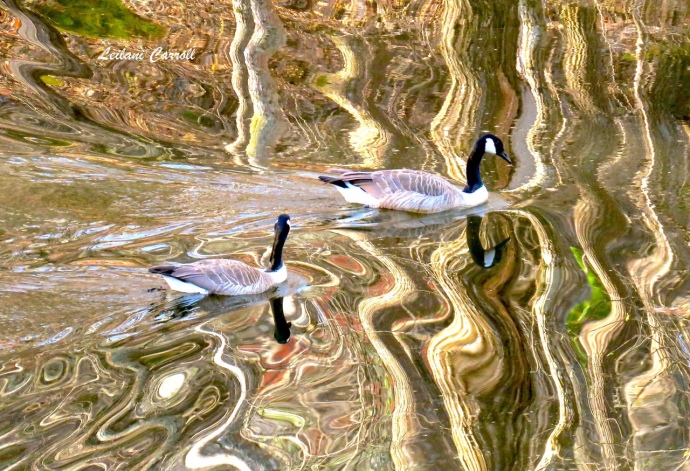
(artist credit: Leilani Carroll)
Momentous Occasions
momentous occasions
these walks
along the river
so much has changed
last week
this tree was still gold
this week it is undressed
ready
for another winter
three days ago
three pied-billed grebes
dabbled along the edges
of this little pond
today
today
two dozen Canadian geese
have taken their place
bobbing
butt-up
in the gentle drift
yesterday
before the rains came
this creek
was almost dry
and that one black boulder
the one that always catches your eye
was easy
to walk to
today
it is almost underwater
and the sound
the rushing waters make
rushing over it
is all the medicine
you think you will ever need
M A H Hinton grew up in Montana, lives in Minnesota. His publications include poetry in Spitball, Temenos, GFT, and West Texas Literary Review. He has also published several Western short stories.
CATHRYN COFELL
Red Rover
(for Sylvia Cavanaugh)
I know now that I want to kiss red,
the red girl across the street,
all fringe with red insight,
alight with the weight of red.
I think of you, and the way we read each other,
star-bone kind of red, and that our hearts
in the jumpy bang bang of red
heaving to the score of red notes.
It wears me down to a jittery red.
Having whirled from red hands,
I sense the red I cannot grasp.
All this red before that endless loosening.
I want this red to last,
but Red teaches baton lessons.
Red says it feels like being in high school again.
It’s about how red can arrive in so many forms.
Red permeated our lives,
red laid out on sofas,
our lives latched to the red next door.
That was how I turned sky red.
Now I wield my own red fire.
There will be no more red hiding.
Cathryn Cofell is the author of Sister Satellite (Cowfeather Press) and six chapbooks. She believes that poetry and the arts are crucial for positive health and healing and has advocated fiercely as a member (now retired) of the WI Poet Laureate Commission and WI Academy of Sciences, Arts & Letters, and as a current volunteer with the Fox Cities Book Festival and Wisconsin Fellowship of Poets. www.cathryncofell.com.
GUY THORVALDSEN
The Epilogue Writes Itself
Once a week we talk on the phone.
She says he’s still around,
appears in unexpected places
as she wanders
around the half-empty house,
a compass without a needle.
He’s there in the recesses of the pantry,
an extra fuse box he had installed,
connected to who knows what.
The garage yields an old fishing sweater,
a pair of dull nail clippers
hidden in a pocket.
On the dining room wall, a photo
slipped behind another photo–of them.
In a workshop drawer,
a collection of six nozzles for the garden hose–
all broken.
Today, as we talk,
she reports a woodpecker
banging away at the house.
She’s sure that it must be him,
worried about money,
how much she’s spending.
We laugh.
Are silent for a time.
Go on.
Guy Thorvaldsen’s poetry has appeared in Alembic, Alligator Juniper, The Aurorean, Forge, Gulfstream, Perfume River Poetry Review, Zone 3, Poet Lore, and Verse Wisconsin. He teaches English at Madison College in Madison, Wisconsin. He is also a journeyman carpenter, husband, father, and contributing poet/essayist for public radio. His first book of poetry, Going to Miss Myself When I’m Gone, comes out in October 2017.
EMILY BOWLES
A Scale, My Fate
Mother, Ma’at, judge not the weight of my heart:
this regulation of seasons and stars
requires a body-mind more stalwart
than mine:
thicker, fleshier, without scars.
Disruptive, corruptive,
or creative,
forces rage within me, withouting me.
It started as order,
like any disorder:
numbers, pounds, calories.
Order.
Reduce.
Disorder.
Mother, Ma’at.
This is my offering.
Feathers, that’s all, father, winged suffering.
Feathers, that’s all, father, winged suffering.
Scars like lace, spinal delineation
calcite toughening.
Never enough.
Brittle gnashing of teeth against my skin.
I would not eat:
steak meatloaf string cheese turkey sandwiches chicken noodle soup bacon burger dogs those Burger King “hot and cold” side burgers all of the things that he believed was needed for feeding.
His hand, my mouth open.
His hand, my eyes shut.
Never a golden scale for my heart,
not after that
father-force-feeding-me feast.
The scales tremble, tauten at my full weight.
Psychostasia, on stage. A scale, my fate.
Psychostasia, on stage. A scale, my fate.
I floated
weightless
and without wings.
No bird singing no song.
Not even a note.
The jars fit, just so:
one for my lungs,
one for my limbs,
one for my muscles,
one jar for my heart,
one for my lips and tongue,
one for my bones, each tiny bird bone.
And I wanted to hold them (hold me).
Containers,
contain me.
That is the art.
Mother, Ma’at, judge not the weight of my heart.
Emily Bowles is a poet, teacher, and freelance writer in Appleton, WI. Her work has been accepted for publication in the Wisconsin Fellowship of Poets’ 2018 Calendar, Page & Spine, and Word Curd.
TRICIA KNOLL
February Morning Flashes
Jumbo snowflakes clanned together at dawn
into a thirty-minute stipulation, a warning not to plant
peas today. During morning rush outside the school,
parents planned to be somewhere else
before anything serious piled up. Like the tiniest flakes
of gold that keep the pan moving in a melt-swollen river
as hints of reward wash downstream,
this snowstorm never stuck. Fool’s gold.
Or brittle bits. My nugget from the Berlin wall.
Piles of cliff-side rubble from the blasted Afghan
Buddhas of Bamiyan. Grit that sifts
through fingers at the sand box. A press release
on George Bush’s paintings
of vets he ordered into battle,
who came home wounded, visible
and invisible hurts, their paint–blurred eyes.
Healing may settle in like fine gold dust that sticks
to the bottom of the pan. Or float like the short-term
snowflake that melts on the would-be daffodil. Or
insist you befriend both the whole and fragment Buddhas.
Tricia Knoll is an Oregon poet whose work appears widely in journals and anthologies. Her collected poems include Ocean’s Laughter (Aldrich Press) and Urban Wild (Finishing Line Press). Broadfork Farm will come out from The Poetry Box in summer 2017. Website: triciaknoll.com
MARGUERITE G BOUVARD
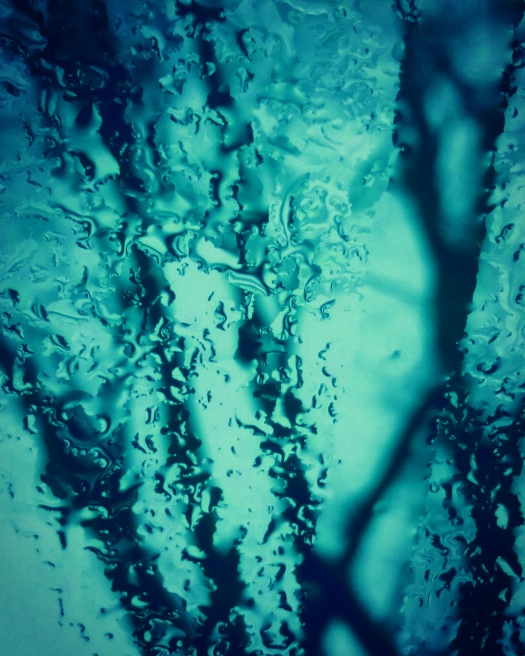
(artist credit: Fiona Capuano)
Another Sunday
is one of silence, the holy water of rain
that blesses trees and meadows, the absence
of words that wound like swords and the chimes
are bells ringing as horses move across
the untainted grass. The rain tells us
that we are drops of water in the cloud whitened
sky, that if we listen to the beating
of our hearts, two becomes one, if we listen
to a stranger, two becomes one. And the meadow
with its green air tells us that we are each
enfolded with its blades of grass, blessed by the earth
who is our mother. In the silence we are all
faced with, we enter our interior where
there is history with its conflicts and discords
but where tensions can dissolve and the continents
are joined, where one is many and where
time has left its messages for us to contemplate.
Marguerite G Bouvard is the author of eight poetry books, two of which have won awards, and 12 non-fiction books on human rights and social justice. She is a Resident Scholar at the Women’s Studies Research Center, Brandeis University.
CLIFF WEDGBURY
Insomnia
He does not sleep well,
Lying in the stillness of a lingering night.
Charts clipped to the foot of an alien bed,
Confirming that something is not quite right.
A sort of justification,
For occupying this valued space.
Another torso,
In a crowded place.
The night-nurse in white,
Glides to and fro.
Like the ghost of an old girlfriend,
He once used to know.
With the gift of white chalk,
A reassuring glance,
He calmly observes the compassion,
Of her watchful midnight dance.
Cliff Wedgbury is a Cork-based poet, born in London in 1946. His last collection, A lingering adolescence, was published by Belfast/Lapwing in 2008.
LAWRENCE WILLIAM BERGGOETZ
After eating alone…
Saffron remains lathered in the air.
A refrain tightened by thought
retreats slowly inside my ears
until it is finally muted and lost.
The howling of a plane passing
directly overhead gradually fades
until silence returns completely
like a river filling its grooved banks
deeply with a storm’s dark rainwater.
Is there anything significant enough
to mark how we travel through
our days? We never know the age
of a tree until it dies and we cut
it open, counting its rings and calling
that history, not realizing that a
rooted life might best know how
to climb past the blinding
channels of sunlight and azure.
Sometimes, quietness seems to be
its own philosophy. I often feel like
a harbor where thoughts dock and
leave uncharted, while the ocean remains
in swing as the pier stares into
the sky, its wooden face the only
stillness between the waves and
blinking eyes of a thousand stars.
Lawrence William Berggoetz has been nominated for inclusion in Best New Poets 2017. He has been published in The Bitter Oleander, Sheapshead Review, Pacific Quarterly, Skidrow Penthouse, Poetry Pacific, JONAH, Oddville Press, and others. Lawrence is a graduate of Purdue University, and has written the book, Under One Sun.
RUTH MCARTHUR
It Is Solved by Walking
A peaceful protest. An ambush.
A bomb delivered by robot.
Complacence and illusion
of safety shattered.
Hopeless
we come together,
helpless
against yet more violence, senseless,
as if there were another kind.
Prayerfully we walk the labyrinth, feet
falling on the path with gentle,
soft scrapes against the crushed granite,
the cool moon our guardian.
This is not a maze,
that trickster’s path
of road blocks,
false entrances, doubling back.
This labyrinth, an ancient archetype,
provides a single path,
spiraling, meandering,
the same for all of us.
One foot after the other slowly
takes us to the center,
then out again.
Cleverness has no place here.
Mindfulness, letting go,
finds it home in the labyrinth.
We walk. Walking quietly,
we send prayers where so many
other prayers have gone.
Walking, we bear witness.
Ruth McArthur lives on acreage in the Texas Hill Country, which she manages for wildlife. She blogs at www.ourrockinm.blog. She birds, practices centering prayer, and loves bringing together people of differing perspectives for dinner, conversation, and labyrinth walks.
GAIL TIRONE
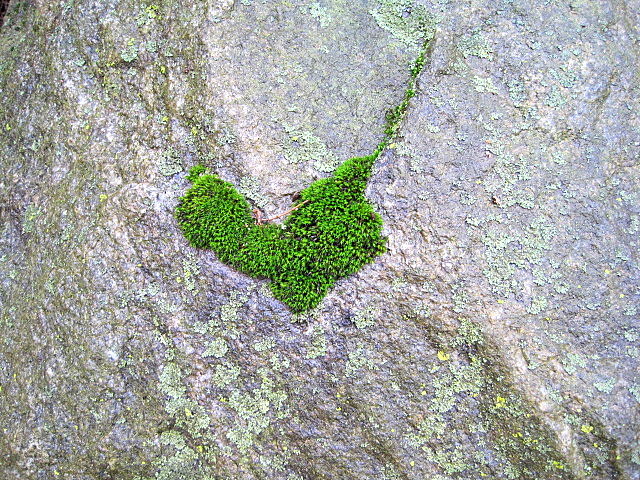
(artist credit: Karen VandenBos)
If Not for Grace
If not for Grace
I never would have been born
or at least born as me
If not for Grace
my father wouldn’t be my father
my father wouldn’t be
Grace as a curtseying girl of five
in an oval portrait in an old pewter frame
suspended on the wall in eternal childhood
Grace suspended, smiling, in her oval frame
as parents age around her
as older siblings mature before her
and new siblings are born to replace her
If not for Grace
my grandmother would never
have given birth again at almost fifty
endangered her own life
to indulge her taste for ribbons and lace
Only to be saddled with another boy
more active and mischievous than his brothers
a boy whose chemistry experiments
exploded every Sunday like clockwork
A boy who would grow up
to study chemistry and medicine
and seek a cure for what killed Grace.
Gail Tirone grew up in New York City and now lives in Texas. She has a B.A. from Princeton University and M.A. in English Literature from the University of Houston. Her work has appeared in Sulphur River Review, The Nassau Literary Review, Free China Review, The Weight of Addition anthology, and elsewhere. She was awarded 1st place and was a featured guest poet in several Houston Poetry Fests.
KATHY LOHRUM COTTON
Bones of Divorce
He sets his broken bones, moves on.
But where darkness dawdles
through canopies of old trees
and lingers long in rooms once theirs,
she takes her mending slow,
like a shattered arm immobilized:
splintered ulna and radius reset,
plaster-casted, hung lumpish,
pressed hot against her breast.
Every ordinary task is
complicated now—not because
his muscled arms are absent;
it’s just that one of hers is tied
to the unhasting work
of healing.
Kathy Lohrum Cotton of southern Illinois is a life-long poet whose work has been published in literary journals, magazines, and anthologies. She is the author of two chapbooks and the illustrated collection, Deluxe Box of Crayons. She serves poets and the art of poetry as a board member and editor for the Illinois State Poetry Society and the National Federation of State Poetry Societies.
CLAIRE JOYSMITH
Unexpected Gratitude
Hurt nudges black onto white
unpleasant sensations prickle
their way into purpled worms
on white unlined paper
So I welcome hurts with
garlands round their necks to
perfume them, coddle them
into a silk memory drizzle
that leaves the air clear
that sheens the pavement
I walk on today and coaxes
buds into growth
waters them into bloom.
Claire Joysmith is a professor, writer, poet, translator, and former healer. Her critical and creative essays, poetry, translation, and self-narrative have been published internationally in Signs, FORUM, Chicana Feminisms, and many others; her poetry has appeared in Voices Without Borders I and II (2009 U.S. National Best Book Award), Literal Magazine, Diálogo, Blanco móvil, among others. She is the editor of One Wound for Another/Una herida por otra, Speaking desde las heridas, and other volumes. Silencio de azules (Silence of Blues) (Samsara, 2017) is her recent book of poems.
SHERYL SLOCUM
Non-Violence
Non:
such a small and simple word
to cork the purple tide
that seeps
into every place I know;
I cannot imagine
a world without red-violet
or ragged midnight blue.
Yet, the antidote,
as smooth as n and o,
slips as easily into weary hands
as infants’ fingers,
weighs as lightly as a laugh,
works as simply as someone
looking into hate and saying,
“No.”
Currently, Sheryl Slocum lives in Milwaukee, Wisconsin, and teaches English as a second language at Alverno College. She is a member of the Hartford Avenue Poets in Milwaukee and of the Wisconsin Fellowship of Poets. Sheryl’s poetry has appeared in numerous journals, including the Anglican Theological Review, Blueline, and The Wisconsin Poets’ Calendar, as well as in several anthologies.
TORI GRANT WELHOUSE
Endocrinologist
Mother hugs her purse,
what she does when
out of her element.
Mostly unassailable
in her pressed slacks and blouse, matching jacket,
she makes me wear a dress
for the appointment. She is always making me
wear dresses. My legs stick
to the leather chair,
a drab teen in the psychedelic 70s.
The office is different
than the examining room of our family doctor
with cherry bookshelves and books, a globe.
I think of the places I would rather be.
Mother thinks I’m fixable.
Perhaps I am.
The doctor breezes in
as doctors do.
I sit in a chair and don’t bleed.
He considers me over the rims of his glasses,
eyes full of bark and fizz like root beer.
Squares of sunlight fall on a leather reading chair and hassock,
plaid blanket spilling to the floor.
The doctor clears his throat,
unseals a jar of butterscotch from his desk,
ring of dime store glass,
smell of burnt sugar.
Despite myself, I salivate.
The doctor tilts the jar towards me, eyebrows raised.
His tweedy jacket and trousers don’t match.
I unwrap a candy, golden cellophane crinkling,
calculating how much farther I will jog later.
The doctor asks questions.
Mother answers. I don’t interrupt.
I do stash pork chop in a napkin at the dining room table.
I can subsist on an apple a day.
I run for miles at dusk, up and down our hilly suburban streets,
eternal light of the catholic church shining at my back.
I read cookbooks for recipes I won’t eat.
Clothes hang on me.
The doctor paces behind his desk.
Mother balms her lips.
I’m good at starvation
but don’t really want to vanish.
I don’t know what else to do.
A boyfriend says he’s through.
I take it as a sign,
an undeserving kind.
Enough, says the doctor.
See this? He points to a print in a frame.
I’m a doctor of chemical messengers.
What you see here triggers response.
Cells are activated.
How does this make you feel?
I see a bridge
and lilypads.
Private space of a gardener.
I could be the gardener,
foreground too verdant for words.
Being a woman is not easy.
All that lushness, ripening.
Did a woman paint that?
I ask the doctor, my voice weedy.
She could have, he says,
steepling his fingers, convinced of the the body’s
elegancies. Mother looks at me,
sets her purse on the floor,
her eyes the same brown as mine
like dark chocolate
like urgency.
Tori Grant Welhouse is a poet and active volunteer with the Wisconsin Fellowship of Poets, recently helping to launch the new lit mag Bramble. She earned an MFA from Antioch International in London. Tori has a chapbook, Canned, with Finishing Line Press, and her poetry has also appeared in Anderbo, Midwest Prairie Review, Passager, Rivet, and others. She lives in Greater Green Bay with a husband who thinks he’s a lumberjack.
KERSTEN CHRISTIANSON
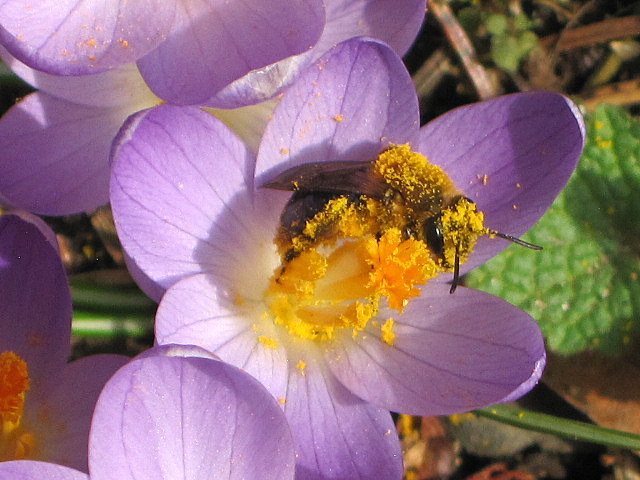
(artist credit: Karen VandenBos)
The Move
In the early days, she hauled
a mattress to the ocean view
windows to sit and cry.
Who can know the origin
of sadness? I recall
only her sorrow, not its source.
In time, she adapted to a northern life,
to its rhythms of sea, storm and gale.
Her yard bonfired
summer flame. Her smooth hands
packed soil around roots of annuals
in hanging moss baskets: jewel-
toned lobelia, pansies, begonias,
geraniums; firmed soil around root-
balled azaleas, rhododendrons, apple
trees. Her long bangs caught, swept
into the anchor of a barrette,
she eyed Snow on the Mountain
in the rockery, thinned their tangle
to yield bloom. She paused to swipe
the back of her gloved hand across
her brow, maybe to catch a loosened
lock, to scratch a bite from a no-see-um.
Mom green-touched her space,
tamped my childhood with wild earth
and cultivated ground. Flourishing
fruit trees, berries, abundant bloom,
this shore I call home.
Kersten Christianson is a raven-watching, moon-gazing, high school English-teaching Alaskan. When not exploring the summer lands and dark winter of the Yukon Territory, she lives in Sitka, Alaska with her husband and photographer, Bruce Christianson, and daughter Rie. She completed her MFA in Creative Writing/Poetry through the University of Alaska Anchorage (2016). Her book of poetry, Something Yet to Be Named, published by Aldrich Press is forthcoming (2017).
ROSEANN ST AUBIN
The Spot
The spot on her forehead
was too off-center
to be the jewel of a bindi
on the brow of an Indian bride.
The spot was rough and red, irregular and raised.
It would not heal.
Once, at the post office
a man startled and pointed.
You’re bleeding, he said.
She saw herself in the glass
over the portrait of the Postmaster General.
There was a bead of blood
large like a ruby
over her right eye.
Dr. Amarjeet took a small knife to the spot and
sliced off thin layers for the lab.
Her skin, under a scope
at 100x magnification,
was a fractured net of cells
that were splitting, dividing fast.
The thing had a name.
It was no longer the spot.
It was squamous cell carcinoma in situ.
And so that Stage I
did not become Stage II
there was chemotherapy cream for bedtime
and sunblock for the day
and hats and long sleeves in the garden.
There will be a small scar,
said Dr. Amarjeet. It is as though
you have been anointed
with a third eye chakra.
He cupped her face in his dry hands.
Wear it as a sign of what has been learned, he said.
A sign of your new-found openness
to the idea of death.
Roseann St Aubin is a freelance writer and media trainer who lives in Port Washington, Wisconsin. She had distinguished careers in television journalism, city government, and school public relations. St Aubin was a 2016 Wisconsin Fellowship of Poets Triad Winner for her work, “Crows.”
ANNIE BLAKE
Tebah
I tell her it is either you or me. I tell her I don’t care
how sweet the scent of the cradle is.
The hand that rocks it looks different
to mine—how soft our pillows were, and how warm
and sanitized by the sun—I am leaving
this country for good, the hulk will rock me, even when I am sick—
I will hold my stomach close to me like I do with my photo of my child.
This current will keep me flowing in the pitch coated basket—
even if she can’t save me in the end—I will open
my eyes and let this sea spin
around and around even though my body signals
that the world is fast asleep. I’ll just have to lie down as low as possible,
the rain is released from the sky’s old mouth—the water’s
arms pull me through the cracks rupturing the ark floor.
These arms are not as buoyant as papyrus stalks. There are things in my mind
I could never talk to you about. She flatters my body. She doesn’t know my body
is inside my mind like the loose skin of a plastic bag
rubbing against a branch; like a newborn caught up in the middle of a hard birth.
There are strange echoes here that you can’t hear. This space
folds its arms because it is adamant I am not empty enough. The mouths
of the sea and the sky are streaming their winds through me like a great god.
Annie Blake is an Australian writer who has work published or forthcoming in Red Savina Review, Antipodes, Uneven Floor, The Voices Project, Into the Void, Southerly, Hello Horror, Verity La, GFT Press, About Place Journal, Gravel, Australian Poetry Journal, Cordite Poetry Review, and more. Her poem, “These Grey Streets,” was nominated for the 2017 Pushcart Prize by Vine Leaves Literary Journal. She is excited about the process of self-actualization, research in psychoanalysis, philosophy, and cosmogony. She holds a Bachelor of Teaching, a Graduate Diploma in Education, and is a member of the C G Jung Society of Melbourne. You can visit her on annieblakethegatherer.blogspot.com.au.
PRISCILLA ATKINS
Anna’s Accordion
Petite tracks
pencil front
and back
of a 4×6 sheet
two creases
one pleat
composed at
the end of three
weeks in Pine Rest.
I didn’t know
what to write.
Anna, 24, tells
hard, neat:
I learned
that I am enough …
Our new pup’s
name is Selah …
The doctor who
got things right
is from India …
I love that she
plucked up
any old
scrap; wrote,
folded, fit
truth and
light
in a 3×5
envelope.
Lick, tamp,
canary-stamped.
Priscilla Atkins is addicted to classrooms and the people in them. In past lives, she taught in Los Angeles and Honolulu. More recently she teaches (and learns) in Holland, Michigan. Her poems have appeared in English Journal, Shenandoah, Poetry London, and other journals. She has a collection, The Café of Our Departure (Sibling Rivalry Press).
JANET MCCANN
Live Where Your Feet Are—Advice
Here they are now on the bed with me.
Ankle with Ace bandage, but they itch,
they want out. They have been many places
on their own, feeling hot black tarmac
and damp sand, soft mud, hard pebbles,
that yellowjacket, ow! They whisper to
each other. As for me, I’m elsewhere—
in a book, maybe even on the roof,
diffusing into cloud, I am a cloud.
Wasps in the orange tile do not bother
me although I hear them. Or I am in Holland
walking the mud flats, but without my feet.
Home is where your feet are. But your heart,
your head, your hands? Once I fell in love
with a man’s feet. Their strong bronze toes
in hand-stitched sandals. The rest of us
didn’t like each other, but still there were
those feet, crossed, underneath his desk,
looking as though he’d always walked the earth.
Journals publishing Janet McCann’s work include Kansas Quarterly, Parnassus, Nimrod, Sou’wester, Christian Century, Christianity and Literature, New York Quarterly, Tendril, and others. A 1989 NEA Creative Writing Fellowship winner, she taught at Texas A & M University 1969-2016. She has co-edited three anthologies with David Craig, Odd Angles of Heaven (Shaw, 1994), Place of Passage (Story Line, 2000), and Poems of Francis and Clare (St. Anthony Messenger, 2004). Most recent poetry collection: The Crone at the Casino (Lamar University Press, 2014). She also has co-authored textbooks and written a book on Wallace Stevens (Wallace Stevens: The Celestial Possible, Twayne, 1996).
MICHAEL JACK O’BRIEN
jazz transformation
when miles’ trumpet asks
“so what?” it talks
to my blue soul.
mom has just appointed me,
at fifteen, “new man of the family.”
my sad man dad
has lost his job
slid into drunkenness
and hit and run
so mom sends me
into bars to fetch him
sitting in darkness.
“so what?”
miles swings that refrain,
shares his dark pain
in rhythm that swings
into a cool guy’s
smooth-easy walk
seemingly just for me,
this white kid saying
“so what?” as i
try to stride
through my
blue world.
Over the years, Michael Jack O’Brien has been published in a number of print and on-line journals, including Cimarron Review, Rio Grande Review, Rag Mag, Out of Line, Wisconsin Review, The Orange Room Review, Main Channel Voices, and, most recently, The New Verse News and Madness Muse. Also, his work has appeared in three anthologies: Gridlock: Poetry of Southern California, Proposal on Brooklyn Bridge, and California: Dreams and Realities.
JESSICA MOSER
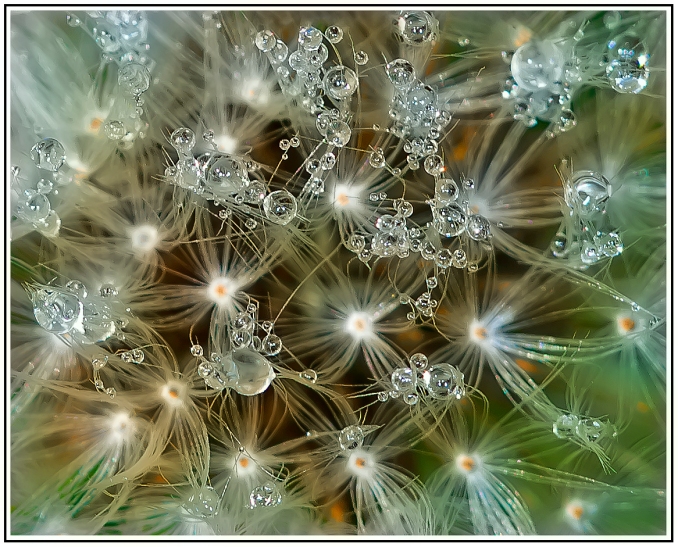
(artist credit: Kurt John Huebner)
Movement Forward
Everyone says to move forward
you need to point yourself toward
where you want to go. But
people forget the kernel inside
that guides us to turn
away from the straight line, to hold a
mirror up because to look directly ahead
would turn us to stone. Emily Dickinson
knew she had to tell the truth slant
to tell all of it. She would understand why
I don’t watch the movies where cancer
kills the heroine. She would understand that
I can only parallel park when I am
singing along to the car radio. This is
not about being afraid to die, or living with
having been sick. This is about recognizing the brilliance
of looking away when a god reveals its true
form. It is about wandering a beach
while afternoon violets to evening, looking
for horseshoe crabs and following the
sandpipers. And also about planting
bulbs in concentric circles, so when they
bloom, they bloom spectacularly.
Jessica Moser was born and raised in New York City. After graduating from SUNY Albany and Hunter College, she has studied poetry at various venues around Manhattan. She lives in New York with her family.
JACKIE LANGETIEG
Coming of Age
The linen smock I wore
was white as frost on a deep pond.
Across the breast
whorls of embroidered butterflies
in pinks, purples and gray-tipped blues
flew off into the night of my growing up
and I awoke to the dense red stain
of my body’s tears.
Jackie Langetieg has published two chapbooks and two collections of poetry, had her work appear in various journals and for the past 25 years has been in all but one of the Wisconsin Fellowship of Poets yearly calendars. She is retired and lives with her son and two cats in Verona, WI.
JIM LANDWEHR
No Cure
His wound was
not life threatening
but chronic and afflicting
it would dog him forever
a condition untreatable
by medicine or drugs.
Home remedies helped,
hearing specific songs
snapshots from albums
thoughts and memories
but were as effective
as cough syrup
for lung cancer.
The pain of his loss
knew no sorrow
it had no faith
cared not about his
race or age,
gender or religion.
His healing showed
no urgency
was deaf to his prayers
like a morphine drip
it came gradual
taking its own sweet time.
Jim Landwehr has two poetry collections, Reciting from Memory, by Underground Voices, and Written Life by eLectio Publishing. His first book, Dirty Shirt: A Boundary Waters Memoir, was published by eLectio Publishing in 2014. He has non-fiction stories published in Main Street Rag, Prairie Rose Publications, Steam Ticket, and others. His poetry has been featured in Torrid Literature Journal, Portage Magazine, Fox Adoption, Off the Coast Poetry Journal, and many others. He enjoys fishing, kayaking, biking and camping with his kids in the remote regions of Wisconsin and Minnesota. For more visit: www.jimlandwehr.com
LYNNE BURNETT
Tao
They meant it as a lesson for not coming when called,
sure she was hiding from them in the small woods, and
drove away, up the gravelly side road, back onto the highway.
What holds us
when we need holding
we never let go of,
like a bare blue sky
hugging the leafless twig
of a child’s body
or arms and fingers, entire fistfuls
of light reaching through tangled
shadows to dry tears.
What draws us in
when we need to belong
we will never disown,
like the forest’s sweet green
breath, drawn from the viny lungs
of a cool, deep silence
or the pale voices of trinity flowers
distinctly noted
above a long drawl of grass.
What eases us
when we are afraid,
we keep, and we are kept oak-strong,
like the wind, its fluted vowels
soothing a consonantal
divide of leaves
or gnarly roots, their bumpy seat,
tickle of ants up a leg, our own voice
humming their marching song:
and they all go down to the ground
to get out of the rain…
They go home.
Looking up then at the branches
spread wide—no less than heaven’s arms
affirming: so will we, so will we.
Lynne Burnett lives with her husband at the foot of a mountain a block from the sea, in West Vancouver, BC, Canada. Poems have appeared or are forthcoming in Blue Heron Review, CV2, Geist, Pedestal Magazine, Pandora’s Collective, Malahat Review, Calyx, New Millennium Writings, Tamsen, IthacaLit, Taos Journal of International Poetry and Art, and a Tupelo Press chapbook anthology. She is the 2016 winner of the Lauren K. Alleyne Difficult Fruit Poetry Prize.
SUSAN TWIGGS
Where Does It Go?
empty plastic bags
fetid piles of clear, green, and blue
caught in the tallest branch
dropped on roadsides
heaped in landfills
overflowing dumpsters
floating in streams
lakes and oceans
strangling a baby seal
choking a sea turtle
microscopic plastic inhaled
by our Friday night perch
piece by piece
earth’s people must gather our discards
and follow Isatou Ceesay’s* lead
making benches and bedrolls
bracelets and purses
cleaning parks and highways
leaving plastic at the counter
packing groceries in cotton bags
We who have sullied the ocean
return to its beaches
clearing the waters for petrel
skimming the surface of the open sea
*In One Plastic Bag: Isatou Ceesay and The Recycling Women of the Gambia by Miranda Paul, Isatou Ceesay cleans up her community in Gambia using discarded plastic bags to make purses.
Susan Twiggs writes poetry and picture books. Her degrees are in Social Work and Psychology. At one time or another she has been a psychotherapist for families and children, a conflict resolution consultant, and a yoga teacher and studio owner. Her poems can be found in The Fox Cry Review, Red Cedar, The Avocet, a Journal of Nature Poetry, online at The Woodland Pattern Book Center 2017 Poetry Month blog, and others. Her poems have been exhibited in the Artist Muse shows the past three years. She currently divides her time between Scottsdale, AZ, Marshfield and Minocqua, WI. She is grateful for her soul mate of over fifty years, John. Susan has a passion for travel, yoga, and all things natural. She enjoys directing plays drawn from picture books with her grandchildren.
LAURA JOHNSON
Not Yet
Almost-solid sand.
Waves whispering roars.
Gray lacking.
Lapping, crawling foam.
Sandpipers advance and retreat –
Busy, hurried, snatching.
A stranger and I
walk toward the pink glow.
Connecting, knowing glances;
camera hope.
The indentation –
a thumb pressed on the sea.
Slow-rising lava hump –
arching boundary
infusing the waiting gray –
pink, purple, blue.
Waves whispering roars.
Sandpipers advance and retreat.
We stop and stare,
raise our lenses in the air
to catch what can’t be caught.
Fire beyond the water,
beyond the thorny Fall,
beyond all groans and grasping,
calling to a gleam inside of us.
Light beyond bearing.
Unreachable beauty.
God’s voice: “Not yet.”
Heads bow,
eyes turn west.
Fire burning
in my breast.
Laura Johnson teaches sheltered English in Fayette County High School’s ESOL program. She graduated from Auburn University in 1989 and will graduate this year from Fairfield University’s low-residency MFA in Creative Writing program. One of Laura’s poems is scheduled for publication in the upcoming summer issue of Georgia Writer’s Association’s magazine Exit 271. She lives in Sharpsburg, GA, with her husband, two almost-grown children, cat, and two dogs.
MARY STRONG JACKSON
Healing
if feet could be ears
pressed to ground
outer rims against earth
inner curves – a funnel
we’d hear the first
bellow of a mammoth
resound through time
awakening a grasshopper
her subtle stretch drawing
steam for the jump – the landing
through your ear-feet
the reverb of ancient drum
do you feel the beat
that taps into your feet
the finger-snaps around the ears
music that weaves through hair
slides across body scars
creates tiny shivers up a baby bird’s back
shakes snakes from winter skins
the whisper of water
that tickles insides
together we cup the ground
with warm rims of ears
press them to earth
gather what we already have
Mary Strong Jackson’s work has been published by various journals and magazines. Her chapbook, “From Other Tongues,” will be published in June 2017 by Finishing Line Press.
DIANE SAHMS-GUARNIERI
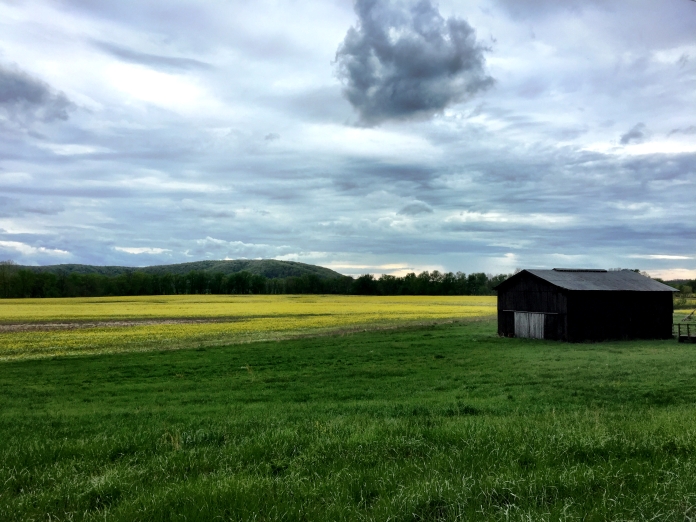
(artist credit: Melodie Past)
Let Memories Awaken
(for Peggy)
For the last 68 years, you a yellow star
at the bottom of a tulip cup; how fragrant
yesteryears’ memories; how their roots hold.
Now – you, thin as a slender stem – I listen
to a hollow voice tunnel through the telephone,
a bud pushing out of bulb’s papery tunic
threads its pointy green tipped needle through
darkness toward breaking light of March’s
strengthening rays, all the while roots
digging deeper into earth’s scarred lungs.
Your diagnosis: Pulmonary Fibrosis, and
I want to uproot it, transplant it, bury it
outside of you somewhere, elsewhere, where it
cannot harm you, like a cactus in the desert
scarring the outward breath of wind, far away
from our family garden, but we know what we know –
your cough worsening, your movements slowing,
a relaxed river before the rising tension
of a changing tide. This news arrives while
daffodils’ jaundice in cold dusting snow;
snowdrops curving spines weighted with dying news;
purple crocuses’ inverted bells crowd churchyard’s
tolling during Passion Week. Yet, earth slowly
wakes from winter’s tomb to revive the weary.
I kneel to pray. This is all I have.
This is hope that the grave will remain distant –
to slow the approach of its onward march.
Death’s unbeating heart, eventually
in its own season, takes us all.
Each life’s prophecy fulfilled.
We dine together at Easter.
I tell you how as a child
I remember prayer meetings held
outside in green clover fields under
open tents of summer song those
long and glorious days of revival.
There’s no need to speak of winter now!
We will splash in seaside waters along the cape;
we will drink white wine; we will dance in long
warm rays of sun’s encircling strength. Fears
tucked away in ocean’s strong pulling undertow.
Let us rejoice now and live in these tender times,
in sunshine. Let memories awaken, despite
the chronic coughing moments of worry
pills sickening the stomach of your spirit
you tenderly dancing in death’s winded wing.
Diane Sahms-Guarnieri, a native Philadelphian, is the author of three full-length poetry collections: Images of Being (Stone Garden Publishing, 2011), Lights Battered Edge (Anaphora Literary Press, 2015) and Night Sweat (Red Dashboard Press, 2016). She has been published in The Philadelphia Inquirer, Pennsylvania Literary Journal, Many Mountains Moving, The Indiana Voice Journal, TheNewVerse News, Canary, among others. Awarded a grant in poetry (2013) from the AEV Foundation; recipient in 2014 of the Commonwealth of Pennsylvania: House of Representatives Citation – for over a decade of community volunteerism in the promotion of the art of poetry in Philadelphia; she was also the 2015 “Winner” of Partisan Press’s “Working People’s Poetry Competition.” She has served as Poet in Residence at Ryerss Museum and Library; as Poetry Editor of the Fox Chase Review; and is currently Contributing Editor at North of Oxford. More about Diane can be found at http://www.dianesahms-guarnieri.com/
JONEL ABELLANOSA
The Great Barrier Reef
This morning I read about The Great Barrier Reef
Dying due to climate change, marine life kaleidoscopes
Bleaching, as if white were capitulation’s color,
The Earth spotted with sadness no ocean can blue,
Aquamarine greenness a distant memory.
I picture the body’s anatomy, branched like full-grown
Corals, young immune system like a reef to algae
And symbiotic sunlight. I imagine decades of neglect,
Greed and abuse, coldness to pleasure’s consequences
Altering colors to bruise violets, tumor pinks,
Reds and grays of foreseeable acquiescence.
But the human body is resilient and restorative,
A metaphor showing shoals and lagoons,
The deep sea cave in the ribcage, islets, and
The way it heals itself as model or design.
Jonel Abellanosa resides in Cebu City, the Philippines. His poetry has appeared in numerous journals and anthologies including, Anglican Theological Review, Rattle, Poetry Kanto, Spirit Fire Review, Episteme Literary Journal, The McNeese Review, The Literary Hatchet, GNU Journal, and Pedestal Magazine. He has two chapbooks, Pictures of the Floating World (Kind of a Hurricane Press) and The Freeflowing All (Black Poppy Review). He is a Pushcart Prize nominee.
KEVIN SHYNE
A Better Place
I will be more alive and more aware
one day, inhabiting a better place.
With every breath I’ll breathe a purer air
transported by an undeserved grace.
I’d like to think that once I’m there
for several centuries or more
I’ll circle back to find
the mortal man I was before –
alone and lost, afraid and blind.
I’ll catch his eye with evidence
of where he’s going to –
the mountain’s majesty perhaps
or ocean’s deepest blue.
I would not try to change his past
but ease the passing through.
If we believe this better place
to be our destiny
then surely we have visitors
who keep us company.
They tell us of the place they’re from,
the home we’ll share one day
if we but look and listen
and welcome them to stay.
Kevin Shyne is a life-long writer, whose work once appeared frequently in corporate annual reports and employee newsletters. Turning to poetry in his retirement, Kevin has had poems published in The Lyric, Poetry Breakfast, Poetry Porch, and Clementine. Kevin lives in a small town in the corn-and-soybean heart of the Midwest, where, along with a group of fellow poets, he helped organize the first-ever poetry reading event for the Prairie Arts Council in Princeton, Illinois.
RONNIE HESS
People Who Live in Glass Houses
We hear it hit the window,
the sound deep like a ball
thrown against thick leather,
a line drive caught in a mitt.
Surely the bird must be dead.
It lies splayed on the snow,
its brown wings limp,
its beak tilted down.
We wait, talk
about how long before
an injured bird freezes,
before a hawk carries it off.
We stand still, culprits,
in our glass house.
But soon the sparrow
moves one wing, then the other,
tucks both under its belly,
tilts its head from side to side
as if checking for a break,
and finding none
flies to the feeder,
as if forgiving us.
Ronnie Hess is a poet and food/travel writer, the author of three poetry chapbooks and two culinary travel guides, Eat Smart in France (2010) and Eat Smart in Portugal (forthcoming, 2017). She lives in Madison, WI.
SUSIE FOSTER HALE
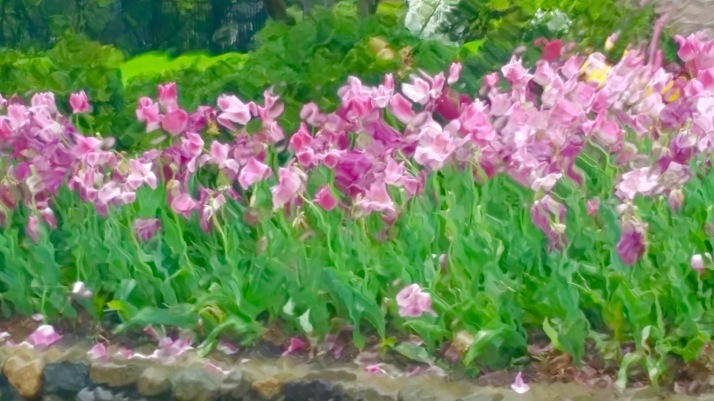
(artist credit: Fiona Capuano)
Meditation
Hands resting in prayer pose, I feel my body dent the spongy surface of the blue yoga mat. I seek to settle the wild lake of my mind. My old border collie struggles to lie down on her therapeutic dog bed. Her front paws extend out as she executes a perfect downward dog pose. But the stiff old hip joints remain stubbornly raised until finally, gravity pulls her bottom end down to the mat. Getting up requires similar tenacity. “Inhale, pause, exhale.” I hear my yoga teacher repeat her mantra during asana as I struggle to stay present. It is painful for me to watch Fancy perform her rituals each day as she paces between poses and seeks my warm hand for attention.
*
Nesting in the thick jungle of periwinkle vines in the large luminescent green clay planter outside my front door, a sparrow sits on four milky eggs snug in a small nest she has knit from dry yard grasses. I peel back the leggy lemon gem marigold to spy on this gift. Red and yellow pouch flowers and purple daisies help to keep our secret. Early each morning when the front door opens, momma bird flies up to the roof and watches her eggs intently until we pass to go out for a slow walk up the street. “Inhalation, pause, long slow exhalation calms the mind, prepares the body for meditation.” Soon there will be baby birds chirping to the sound of my front door latch.
*
Satisfied by our morning walk, we return home to a waning gibbous moon. My old collie pokes her nose over the threshold and stumbles into the house. She is clueless to the new life that incubates off her shoulder, helpless against her own spirit about to rise. I wonder when these nested eggs will hatch? Will these crossings intersect as night into day? In meditation, I usher that divine pause.
Susie Foster Hale has been writing and teaching on San Juan Island in the Pacific Northwest for over twenty years. Her work has appeared in the Shark Reef Literary Magazine, Foliate Oak, and the Soundings Review. She is currently working on a collection of new poems and essays about island life.
JODI ANDREWS
Healer
The back of my right knee – numb.
A coffee table, puppy claws – I feel
underneath the epidermis and twitch my leg away.
My husband avoided it. My own body
made me queasy. Over a year after surgery,
I urged him to palm the patch when his hands
caress my legs. His whole hand on every inch –
even the numb, textured scar, the hair I’m too
afraid to shave – a patch of forgotten
seaweed – he loves every piece of me.
This misplaced puzzle piece he covers –
the scar and my fears disappear altogether.
Jodi Andrews graduated with her MA in English from South Dakota State University in December 2016. She is working on a larger poetic project about medicine and the body. She currently lives in Brookings, SD and works as an English instructor at SDSU. She has had poetry published in Pasque Petals, Oakwood Literary Magazine, and Dark Matter Journal.
LORRAINE CAPUTO
In the Sunset Sea
Bands of rose ripple
across the deep blue water
As I lift my arms above
the golden sun reflects off
the droplets
The gentle waves bathe my Spirit
soothing her
carrying away all the fatigue
all the sorrows
I sink into the sea’s warmth
floating on its salty breadth
watching the now-orange sun
sink deeper behind the hills
Its colors spread wide
across the broken clouds
like an opal
I turn over & over in this iridescent water
just to feel my muscles move
to feel their pull with each stroke
just to know that
I’m still, I am still
alive
Lorraine Caputo is a documentary poet, translator and travel writer. Her works appear in over 100 journals in Canada, the US, Latin America, Europe, Asia, Australia, and Africa; 11 chapbooks of poetry – including Caribbean Nights (Red Bird Chapbooks, 2014) and her new collection Notes from the Patagonia (dancing girl press, 2017); and 17 anthologies. She has also authored a dozen travel guidebooks, and pens travel articles and narratives. In March 2011, the Parliamentary Poet Laureate of Canada chose her verse as poem of the month. Caputo has done over 200 literary readings, from Alaska to the Patagonia. For the past decade, she has been traveling through Latin America, listening to the voices of the pueblos and Earth. Follow her travels at: www.facebook.com/lorrainecaputo.wanderer.
KRISTEN BAUM DEBEASI
African Violets
There’s a wild woman waiting
to hug you,
hold you,
quiet your
distressed soul.
The patriarchy robbed you
of your wild self.
Left a self-loathing,
judging
monster
in your place.
You spit
venom
about idle hands,
the devil’s workshop
if anyone starts having
too much fun,
too much laughter,
silliness,
joy.
You pour your compassion
into African Violets
that shrink if you look at them wrong.
Did you know your girls do too?
Whither on the vine?
Die for your affection?
You never overwatered either—
the violets
or
your girls.
But under water?
Yes. The girls.
I’m thirsty mama.
Touch me gently
like you touch those violets.
Speak softly to me
like I hear you speak to them.
Water me—
not too much,
not too little.
Give me a place of honor
in your house too.
Let me feel the warmth
of sunshine
on my face,
your loving hand
holding me,
pruning away what is dying
so I can thrive too.
Let me feel the love
you pour
into those violets.
Let me thrive,
grow,
bloom—
the greatest gift.
The beautiful blossoming
of a well-tended
daughter.
Kristen Baum DeBeasi was born in the Willamette Valley, Oregon and raised in Michigan’s Upper Peninsula. After graduating from Northern Michigan University, she earned a Master of Music in Theory and Composition from Youngstown State University. Baum DeBeasi currently works as a film composer, while also writing poetry and children’s literature.
SANDRA LINDOW
The Island of Amazonned Women
There’s an Island
of Amazonned Women
east of the setting sun,
and guarded by the moon.
Called Necessity,
it rose like Atlantis out of
the ambiguous ocean
of the twentieth century,
a strand where big medicine
met sisterhood and mythology.
In Parsi, Amazon is ha-mazan,
the feminine form of “warriors”
but Greeks heard a mazos,
“without breast,” an etymological
game of telephone
now made truth by trials
women endure.
March 2013, at a food court
in the Minneapolis Airport,
I was wrapped from behind
in the arms of a woman
I’d never met before.
Seeing head scarf
and lymphedema sleeve,
she recognized a sister
and held me with the sweetness
of shared suffering,
heat and light pouring into me,
an island under the sun.
*About 1 in 8 U.S. women (about 12%) will develop invasive breast cancer over the course of her lifetime. In 2014, there were more than 2.8 million women with a history of breast cancer in the U.S. This includes women currently being treated and women who have finished treatment.
Sandra Lindow, Menomonie, Wisconsin, recently lost her husband of 34 years to a brief, very aggressive cancer. She misses his support and inspiration deeply and is working to turn her sadness and loss into various expressions of beauty. Fortunately, she has many islands of loving connections in her life.
JAMES DOTT
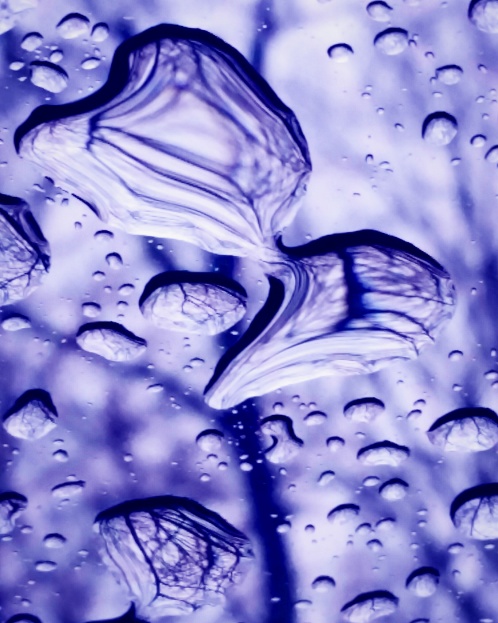
(artist credit: Fiona Capuano)
Fetching Water
she woke
from that clot of dream:
Mother walking toward the dark water,
hair loose down her back,
auburn, amber, gray,
wading in, deeper, deeper
until only her hair
fanned and floated
on the polished black
The air was hot,
her mouth was dry,
no water in the house,
she dressed and found the pail,
the handle cool
across her callused palm,
the light strengthened as she walked,
bird song raining through her,
a yellow warble squeezed from brown,
a trill of garnet rising to ruby,
crow caws, star shards, bursting white, white
when flint sparks steel
At the spring she dipped and filled her pail,
her dampened skirt hem,
the eddy of milky bubbles,
the fog just off the beach,
fading, clear
She lugged it down
to watch the back-lit breakers lift to cresting curves,
hold and hold, over-top, then break,
cataracts of emerald slurred with leaf-bud green,
frothing into white cumulus, nimbus gray,
foam enswirling ankles
as she turns and turns,
the pail sloshing over,
in the draining wake
a psalm plumbed from deep-water blue
Oh, rib of dust,
come, be quenched
all of this is yours
James (Jim) Dott lives in Astoria, Oregon near the mouth of the Columbia River. He is a retired elementary educator who taught in Oregon and overseas. He is the author of, A Glossary of Memory, an imagined memoir in 26 poems. He has been a programmer and producer at the local community radio station, an actor in community theater productions, and co-host of a monthly poetry open mic. His poetry has appeared in Green Linden, Southern Poetry Review, Turtle Island Quarterly, Rain, Squid, and Written River.
CHELSEA COMEAU
Palo Santo
The way the cherry blossoms bathe each morning of their spare lives
in the spring sun’s water, you bathe in the smoke, the shaman
moving her hands above your body, which has waited so long
for permission. To be allowed to heal. Later, the smell of sacred wood
will have woven its way into your clothing, hair, will leave itself
in the centre of your pillow. You will hold space for its weight in your lungs,
your body remembering the smoke’s slow pouring. How it filled you,
washed out even your darkest, wounded places.
Chelsea Comeau is a freelance writer and editor whose work has appeared in Quills, CV2, BUST Magazine, and The Maynard. She was the 2015 Canadian winner of the Leaf Press chapbook contest, and is currently serving as the Artist-in-Residence for the month of April at the Anvil Centre in New Westminster.
JOANNE M CLARKSON
Moon Medicine
Bring me your sorrow, your sleeplessness.
Scatter them among my shadows.
Bring me your loss, your loneliness.
Bury them under my dust.
Bring me your failures, your mistakes.
Leave them in the center of my crescent.
Bring me guilt and shame.
Place them forever on my dark side.
Bring me the times you felt unseen.
Offer them to my great white Eye.
Bring me the chance you didn’t take.
Search for it again in moonlight.
Bring me wounds and scars.
Lay them deep in my craters.
Bring me everything you wish to heal.
I will give you the elixir of dreams.
Joanne M Clarkson’s full-length poetry collection, The Fates, won Bright Hill Press’ annual contest and will be published spring 2017. Her chapbook, Believing the Body, from Gribble Press was published in 2014. Poems have appeared in such journals as Poet Lore, Western Humanities Review, Alaska Quarterly Review, Fjords Review, and Rhino. Clarkson has Masters Degrees in English and Library Science, has taught and worked as a professional librarian. After caring for her mother through a long illness, she re-careered as a RN specializing in Home Health and Hospice Care. She lives with her husband in Olympia, Washington.
JANET TALIAFERRO
Lover
We met when I was seventeen,
The party was aglitter
and I felt like a waif
until I discovered him.
With him in hand I was
as secure as at home
in my own bed.
So we kept company whenever
I was out; lazy afternoons,
at dinner and even lunch.
My constant companion in college
I began to take him to my room.
We celebrated birthdays,
graduation and a wedding.
If I was sad he was my comfort.
Angry, I could rail and he would
understand. Disappointment faded
and I would sleep.
In time the familiarity
became abuse; bruises,
dark places I didn’t want to go
with people I shouldn’t meet.
Unreliable, I never knew
when we would rejoice
in some small discovery or treasure
and when we would rage.
I couldn’t stop seeing him
until I met a woman who showed me the way
to divorce Johnny Walker.
Janet Taliaferro is a resident of Northern Virginia in winter and Northern Wisconsin in the summer. A member of Wisconsin Fellowship of Poets and the PaperBirrch Poetry group, she holds a BA from Southern Methodist University in Comparative Literature and an MA in Creative Studies from the University of Central Oklahoma, where she received the Geoffrey Bocca Memorial Award for Graduate Studies. Her short stories and poetry have appeared in numerous small magazines and anthologies. Her novel, A Sky for Arcadia, was a finalist in the Oklahoma Center for the Book Award.
PRERNA BAKSHI
The doctor I tried to forget. And failed.
(In memory of my beloved sister)
The lady doctor who looked after my sister – when blood cancer decided to barge into my sister’s life, uninvited, like a bullying troll – shared a similar name to hers. She was in her late 20s, just like my sister. Young and competent, for over a month, she tried her best to save my sister, but in the end, the troll won.
If there’s one thing that a troll is good at, other than abusing and attacking people, then it is demanding attention and asking questions. And so it did. The 20-year-old me, stubbornly upset with God, was upset with his people too. Though appreciative of all her efforts, I wanted to remove that doctor from my memory. So I tried to forget her and failed.
Life is the biggest troll there is. After several years, my now retired mother tells me, that the doctor turned out to be her teaching colleague’s daughter. My mother and her colleague had shared staff rooms and meals for several years. Never knowing that one day, they would find themselves, tied by a knot of plain white cloth – cotton, 65 x 90 inches – that when untied, would leave wrinkle marks behind.
That day on the phone when my mother finally broke this news to me, after several years of willfully ignoring the doctor, I caught myself asking the only thing I could: How’s she?
Prerna Bakshi is a writer, poet and activist of Indian origin, currently based in Macao. She is a two-time Pushcart Prize nominee and the author of the recently released full-length poetry collection, Burnt Rotis, With Love, which was long-listed for the 2015 Erbacce – Press Poetry Award in the UK and cited as one of the ‘9 Poetry Collections That Will Change The Way You See The World’ by Bustle Magazine in the US. Her work has been published widely, most recently in Chiron Review, Up the Staircase Quarterly, HEArt Online, The Ofi Press and TRIVIA: Voices of Feminism, as well as anthologized in several collections, most recently in A Shadow Map: An Anthology by Survivors of Sexual Assault (Civil Coping Mechanisms, 2017). She tweets at @bprerna. For more information: http://prernabakshi.strikingly.com/
JUDE GOODWIN
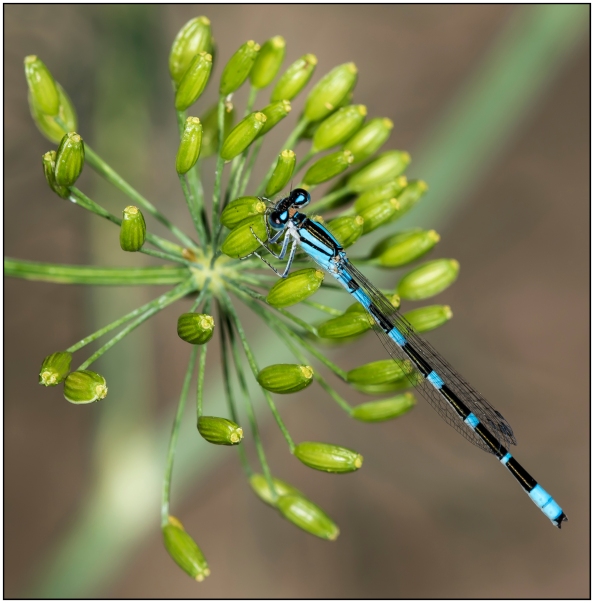
(artist credit: Kurt John Huebner)
Sparky
The baby didn’t grow.
His helix was made
from old stuff, entropic.
He sailed a while,
his heartbeat charged
with light, a tiny blip
in the sea of womb,
but papers rustled,
clipboards bore the weight
of this note and that
and doctors closed the door
behind them leaving the word
reabsorb like a small cough.
I hauled it home anyhow,
my useless boat,
where the knitted things
undid their knots.
One night a few weeks later
I awoke to a call,
like that of a boy racing up from the beach
with a sweater full of gull eggs,
and I rose to find the grey morning
lifting its wing.
Jude Goodwin’s poems have been published in print and online by various journals including Burnside Review, CV 2, Comstock Review, White Pelican Review, Cider Press Review and Eclectica Magazine. Her poems have also won or placed well in the IBPC: New Poetry Voices competition, were shortlisted in the CBC Radio Literary Awards, and received Honorable Mention in the Jessie Bryce Niles Chapbook Competition. Jude is a founding member of the Squamish Writers Group and founder and co-editor of The Waters, an online poetry workshop. She is currently pursuing a degree in Creative Writing with Douglas College, BC, Canada. Her website is judegoodwin.com
KARLA VAN VLIET
River Speak
I say again, I’ve come to the river.
I am the wild thing on this shore
raw blood and spit and near silenced.
River river full of grace, I say the river’s name,
my mouth full of (rocks) prayer full of supplication
and the river sings back to me and slowly, (slowly,)
like the young I began to speak a new language.
I was an exile from my own being (bird crashing
against glass) so to speak I must start from the beginning.
Let the sound come rusty and halting, rise from my throat
stone tumbled. Let syntax be of birdcall, toward
presence, (I am here, I am here, I am here.) Let me
baptize this body, immerse in the cold mountain waters,
stand up in blessing, in the shroud of wet
with this new tongue on my tongue crying out.
Can’t you hear? It’s a flock of crows
filling the branches with their dusky featherings.
Karla Van Vliet is the author of two collections of poems, From the Book of Remembrance and The River From My Mouth. She is an Edna St. Vincent Millay Poetry Prize 2016 finalist and was nominated for a 2015 Pushcart Prize. Her poems have appeared in Poet Lore, Blue Heron Review, The Tishman Review, Green Mountains Review, Cronnog Magazine, and others. Her chapbook, Fragments: From the Lost Book of the Bird Spirit, is forthcoming from Folded Word. Van Vliet is a co-founder and editor of deLuge Journal, a literary and arts journal, as well as the administrator of the New England Young Writers’ Conference at Bread Loaf, Middlebury College.
SUSAN MARTELL HUEBNER
Mindful with the River
(Who can we turn to in our need? Not angels, not humans, and already the knowing animals are aware that we are not really at home in our interpreted world. –Rainer Marie Rilke, in Duino Elegie)
There is solace in remembering
our world is but interpreted
Things are as we see they are
At Center Road
the river is a wanderer
she sometimes rolls within her banks
and sometimes oversteps them
In the hospital
I am just a body
scheduled on the table
It slides beneath a tall steel arm
that targets rays through startled flesh
I interpret things my way
and choose to drift free with the river
that flows beneath her silver bridge
Sun gleams gold upon my body
Waving reeds caress my breast
My cells remember who they are
My river knows her mind
Susan Martell Huebner lives and writes in Waukesha County, Mukwonago WI. Her poems have appeared in publications both online and in print in such publications as the Wisconsin Poets’ Calendar, The Cancer Poetry Project, Kind of a Hurricane Press publications, Main Street Rag Time Anthology, and many others. Her first novel, She Thought the Door Was Locked, was recently published by Cawing Crow Press. Find more of her work at www.susanmhuebner.com
LAUREL DEVITT
The Laying on of Hands
They’re almost scars now, the raw etchings
carved in his skin like crazy body art.
I spotted him chained, staked, skinny
and circling, a living tether ball
on a lonely highway to nowhere.
Now he follows me to my couch,
clambers up, a colossal drowsy lapdog
with dozy eyes and a lolling tongue
lazily lapping my cheek.
He’s loving, as I am, being loved.
For him there is only this:
the laying on of hands;
here, now.
He is spared the bother
of knowing
the laying on of hands,
like freedom, like food,
like a safe haven,
is a fleeting, albeit welcome,
miracle.
Laurel Devitt lives and writes in La Crosse, WI, God’s Country. She is retired from the University of Wisconsin-La Crosse and is now free to spend more of her time reading and writing. She is a graduate of UW-Madison’s English Department. Go Badgers! This past year she had poems in The Ariel Anthology, Words and Other Wild Things, Poem of the Day, Blue Heron Review, the Museletter (WFOP), and other publications.
KELSEY DEAN
Paper Stars
My mother added a fold to a square piece of paper for every lock of hair she lost. Her fingers planted creases among flat flowers, and her wrists formed a temple for a thousand paper stars. She had no need for cranes; she was already suspended in the sky.
My mother turned a noose into a fishing line and snagged a sea of steady heartbeats. Paper stars cascaded from her palms and gathered into constellations at her feet. What’s a pair of breasts, anyway? My mother caught the sky, piece by fragile piece, and locked it in her chest.
Kelsey Dean lives in Seoul, where she teaches kindergarten and writes and paints in her spare time. Her work can be found in quite a variety of literary journals and anthologies, and is forthcoming in Liminal, Cicada, and Lilac City Fairy Tales. You can see more of her art and writing at kelseypaints.tumblr.com.
MARTIN WILLITTS JR
Ceremony
Beating swords into plowshares — Isaiah, 2:4
(Note: After America dropped the atomic bomb on Japan, the Picuris tribe buried their weapons.)
When I returned from Vietnam, I needed a ceremony
to get over the horror I’d seen as a medic,
I thought of burying weapons.
But I did not have a weapon;
therefore, I buried the parts of war I had —
medical supplies and grief.
The hole I dug was never deep enough. I dug barehanded,
making a circle, requesting the earth for forgiveness,
but it accepted healing. I thanked the earth.
The only obstacle we have in life is unwillingness
to face disappointment. We walk in cycles
around where transformation waits.
Martin Willitts Jr is a retired Librarian living in Syracuse, NY. He has over 20 chapbooks including the winner of the Turtle Island Quarterly Editor’s Choice Award, The Wire Fence Holding Back the World (Flowstone Press), plus 11 full-length collections including, How to Be Silent (FutureCycle Press, 2016), and Dylan Thomas and the Writing Shed (FutureCycle Press, 2017).
BOBBIE LEE LOVELL
The Healing
One day it happens.
The morning sun dazzles
rather than burns,
and the grass beneath your own feet
looks green enough.
You don’t know how
you got here, and you don’t
trust the healing.
Perhaps you’ve just found
a new way to cope,
to self-medicate.
But even numbness
feels different, and look:
where your wound gaped
wide as a primal scream,
a close-lipped scar now smiles.
My touch merely tingles.
Freedom feels so foreign
you reconsider the cage.
But that choice is no choice.
So you leap, and wings appear.
You fly into the dawn.
Wisconsinite Bobbie Lee Lovell won the 2016 Kay Saunders Memorial New Poet Award and has been a Pushcart Prize and Best of the Net nominee. Her first chapbook, Proposition at the Walk-In Infinity Chamber, is being published by Finishing Line Press. At this moment, Bobbie is quite possibly working, hiking, or spending time with her children. More at bobbieleelovell.com.
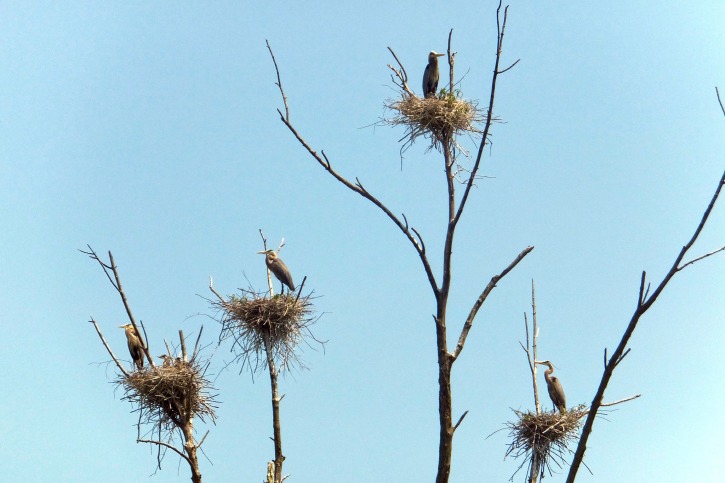
(artist credit: Jason Iffert)
ARTIST BIOGRAPHIES
PD LIETZ (Cover Artist) ~ Pd Lietz is a widely published artist from Canada. Her writing, art, and illustrations have appeared in, and as covers of, many publications: Naugatuck River Review (Summer 2011 & Winter 2013), MaINtENaNT: Journal of Contemporary DADA Writing and Art (#4, 5, & 6), Visions, Voices and Verses, Sunrise From Blue Thunder, DoveTales “Occupied” an International Journal of the Arts, Uncoil A Night, Beautiful Women an anthology, Origami Poetry Project, Songs of Sandy, When Women Waken, to name a few. She is also artist-in-residence for Writers for Peace. Links: http://www.pdlietzphotography.com; http://writingforpeace.org/artist-in-residence; http://saintjulianpress.com/index.html; https://twitter.com/Paula_d_Lietz; http://madswirl.com
JASON IFFERT ~ Jason Iffert moved from the Twin Cities to Lake Country, WI about eight years ago. He graduated from Minnesota School of Business with a short degree in graphic design and marketing. Jason also studied art history at the University of Minnesota. He started using his first camera in 2007. After moving, Jason started a little business called ID (Iffert Design). He currently works as a freelance graphic artist and photographer.
DEVI S LASKAR ~ Devi S Laskar’s poetry has appeared or is forthcoming from such journals as the The Atlanta Review, Carve, Dogwood, and The Raleigh Review, which nominated her for Best New Poets 2016. Her second chapbook, Anastasia Maps, will be published by Finishing Line Press in January 2018. She lives in California.
ROBINA ANSTEY ~ is a contemporary visual artist whose work is admired and collected worldwide. Her art is mainly “expressive and visionary” with a strong emphasis on coastal and floral themes. Her palette is bold, expressive, and deeply emotional. To see more of her work, please visit her art pages on Instagram under Rebel_Heart75 and Fine Art America at: https://fineartamerica.com/profiles/robina-anstey
or email: robinaansteyart@gmail.com
KURT JOHN HUEBNER ~ is an amateur photographer who lives in the Mukwonago area of SE Wisconsin along with his supportive poet and author wife, Susan. A lifelong love of nature, and science in general, evolved into a strong photographic interest in close-up and macrophotography. He is very interested in the dragonflies and damselflies of Wisconsin and is making an effort to study and photograph as many species as possible – 65 species to date. Hunting dragonflies also allows him to come into contact with, and image, butterflies, insects, wildflowers, birds and animals, and the occasional landscape. Being in the woods, meadows, streams, lakes, and marshes seems to compliment his introversion and settles his ever-curious brain to a calm focus. He states that he prefers nature photography because, “The bugs don’t complain about how they look in an image.”
LEILANI CARROLL ~ has had an appreciation for all things “nature” for as long as she can remember, but birds of all species are her passion. Leilani is a retired RN who has adapted her photography around the limitations of living many years with young onset Parkinson’s Disease, which is now very advanced. Despite her disability, she thinks “outside the box” to find ways to capture many of her images. Always using the opportunity to give credit to our Creator for the beauty that can be found in everyday life. Leilani lives in Birmingham, Alabama with her husband, Gary, with the good fortune to have a small lake in back and a neighborhood that adjoins a 10,000-acre State Park. She is delighted when any of her photos can spotlight “Alabama the beautiful” and the treasures it holds for those who look, listen, and linger.
FIONA CAPUANO ~ was born in Istanbul and raised in New York City. Fiona has an MFA in Fiction Writing from The New School and a BA in Clinical Psychology, Art History, and Creative Writing from NYU. She loves photographing birds that fly to her windows. She has a genuine spiritual connection with Nature. Her Nature photos are on display in permanent collections in Village Hall and Ridgewood High School, and have been awarded by the Ridgewood Arts Council (2016). Fiona’s New York City architecture photographs are in print (It Happened in Manhattan, Penguin Putnam, 2001). She shares her latest photos on Facebook and Instagram. Fiona is also a surrealist painter. She sells paintings in New York art shows. Her paintings appeared as the set for a play about the effect of bipolar disorder on a family, Next to Normal (Porchlight Productions, June 2014). She teaches kids through art and poetry workshops. Fiona is a poet and gives poetry readings in New York. She lives in New Jersey with her husband, two kids, and a dog. Find her art and poetry at: www.fionacapuano.com
KAREN VANDENBOS ~ From the time she read her first story book as a young girl, to her high school years of being active in journalism and editor of the student writing & art magazine, Tabard, Karen A VandenBos has always known she has the heart of a creative spirit. Being a seeker by nature, Karen’s curiosity led her to explore many interests. Some let her follow her muse, like having a few of her poems published locally, while others steered her way off course. In 2008, Karen completed a PhD in Holistic Health. One of the courses was about Shamanism which influenced her to write her dissertation on the healing power of nature and the importance of finding one’s totem animal(s). Just three years ago, photography connected Karen to her spiritual path. While she has always dabbled in photography, this time taking photos has become her passion. It is nature that speaks to her heart and Karen’s photographs showcase this connection.
MELODIE PAST ~ is a painter and a photographer with a large and expansive body of work. She was recently the featured artist for About Place Journal. Melodie, who can be found on a popular social network, has sold her paintings and photography to various collectors nationwide and internationally. She welcomes offers and inquiries.
Copyright © 2017 Blue Heron Review ALL RIGHTS RESERVED
(Blue Heron Review holds first publication rights of poems. All original rights go back to individual authors/artists.)